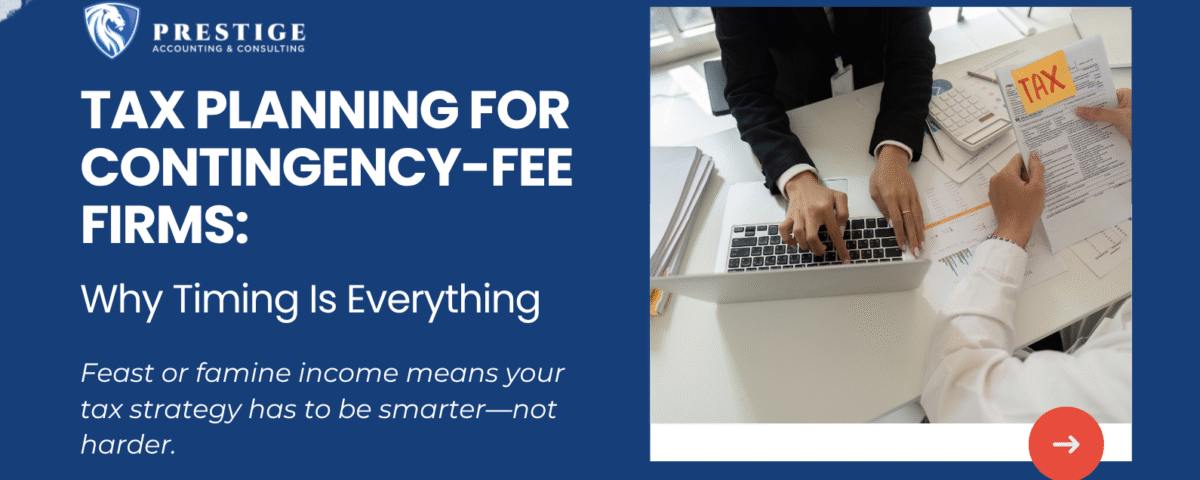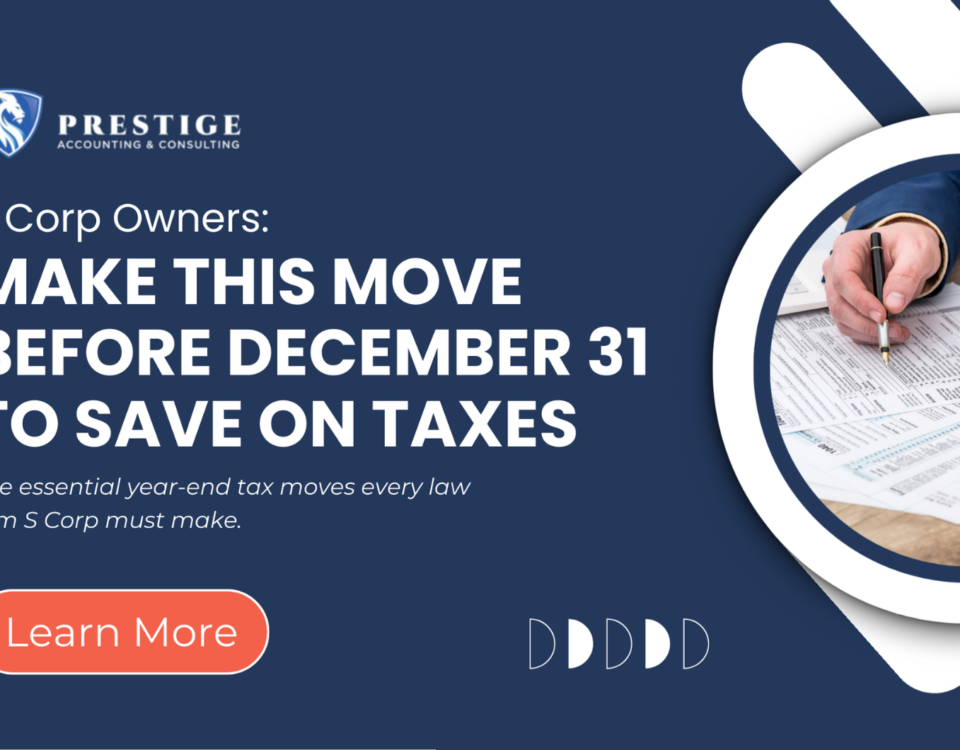
How to Use Year-End Bonuses Strategically (Without Wrecking Cash Flow)
October 28, 2025
Final Call: What to Do Before December 31 to Cut Your Tax Bill
November 4, 2025Tax Planning for Contingency-Fee Firms: Why Timing is Everything
Contingency-fee firms live in a world of feast or famine—so tax planning has to be smarter, not harder.
If you’re a personal injury, employment, or mass tort lawyer, your revenue doesn’t come in neatly every two weeks. One month you might settle a six-figure case. The next? Silence.
But the IRS doesn’t care that your income is lumpy. They want their cut—on time, and with interest if you miss it.
So what’s a contingency-based law firm to do?
This blog breaks down why timing is everything when it comes to taxes, and how to plan ahead—even when your case outcomes are unpredictable.
🎯 Why Contingency-Fee Firms Need a Different Tax Strategy
Unlike firms on hourly billing or flat-fee models, contingency firms:
- Can’t easily predict income month-to-month
- Often incur significant case expenses upfront
- Might go months—or years—without a payout
- Get hit with huge tax bills in the year a settlement finally comes in
That volatility makes cash flow and tax planning especially tricky. If you’re not proactive, you could:
- Owe more than 35% of a settlement in taxes
- Miss estimated payments and rack up penalties
- Accidentally trigger IRS audits due to income spikes
- Struggle to pay team bonuses or reinvest in growth
⏳ Timing Is Everything—Because the IRS Goes by Your Deposits
Even if your case took three years to settle, the IRS will tax the full amount the moment it hits your bank account. The tax code doesn’t care that the work was done years ago.
For cash-basis firms, you pay tax in the year you receive income—not when you earn it.
⚠️ That means you can hit six- or seven-figure income in December and owe tax in April—with no time to adjust.
🔍 Key Tax Planning Moves (That Depend on Timing)
Here are some real tax strategies—but only if you act before December 31:
1. Defer Income to the Next Year (if possible)
If you can legally delay disbursement of a settlement or fee to January, you push the tax bill into the next year.
📌 Caveat: You can’t defer income you’ve constructively received. If the check is in your name and available to deposit, it’s taxable—even if you wait.
2. Accelerate Expenses
You can deduct:
- Case costs you’re allowed to write off
- Equipment or software purchases
- Marketing expenses
- Charitable contributions (corporate limits apply)
The key is to pay before 12/31 if you’re on the cash method.
3. Contribute to Retirement
Max out retirement plans like:
- Solo 401(k)
- SEP IRA
- Cash balance plans for high-income years
These contributions can reduce your taxable income by tens of thousands of dollars—but they must be planned in advance.
4. S Corp Salary Adjustments
If you’re an S Corp, adjusting your reasonable salary vs. distributions before year-end can change both your tax and cash situation. But don’t wait until January—your payroll cutoff is December 31.
💸 Don’t Forget Case Expenses and Reimbursements
Most contingency firms advance case costs, and depending on your accounting method, you may or may not be able to deduct those expenses immediately.
- Cash method: You can’t deduct case costs until reimbursed—unless structured as a loan.
- Accrual method: You may deduct some case costs upfront, but proper documentation is key.
📚 Tip: Talk to your CPA about using a separate cost advance account or formal loan agreements. It matters more than you think.
🧠 CPA Pro Tip: Use a Contingency Fee Reserve Fund
If you’re not already doing it, consider building a tax reserve:
- Set aside 30–35% of every settlement immediately.
- Track this in your books separately.
- Use it to cover estimated taxes, payroll, and upcoming costs.
It’s not exciting—but it keeps you from writing a $100K check to the IRS with $15K in your operating account.
🚩 Red Flags That You’re Not Planning Correctly
- No estimated tax payments made all year
- Receiving large settlements in December without projections
- No plan for funding your SEP or 401(k) until March
- No tax reserve set aside for large contingency payouts
- Running payroll in January to “backdate” income allocations
These are common—and they’re the reason so many successful contingency-fee lawyers still feel broke.
💬 Final Word from The Lawyers’ CPA
If your firm’s income arrives in waves, your tax planning has to be smarter than average. One bad tax year can cancel out a dozen good ones.
You didn’t build your firm to gamble on tax season.
You built it for freedom, growth, and generational change.
But that only happens when your financials and your calendar are aligned.
Ready to prepare for a big payout—or minimize tax on one you just received?
👉 Book a strategy session with our team of CPAs who specialize in contingency-fee law firms: Schedule Your Consultation




